The COVID-19 pandemic has unleashed an unprecedented spread of disinformation.
An investigation published in Gaceta Sanitaria by the ScienceFlows team confirms the COVID-19 infodemic in Spain and concludes that “approximately an average of four hoaxes were sent daily about direct actions on people’s health. One of the possible reasons why these hoaxes were spread was because of the appeal of the messages, because of the home use strategies and because the medical authority criteria was used in the dissemination of the hoaxes”.
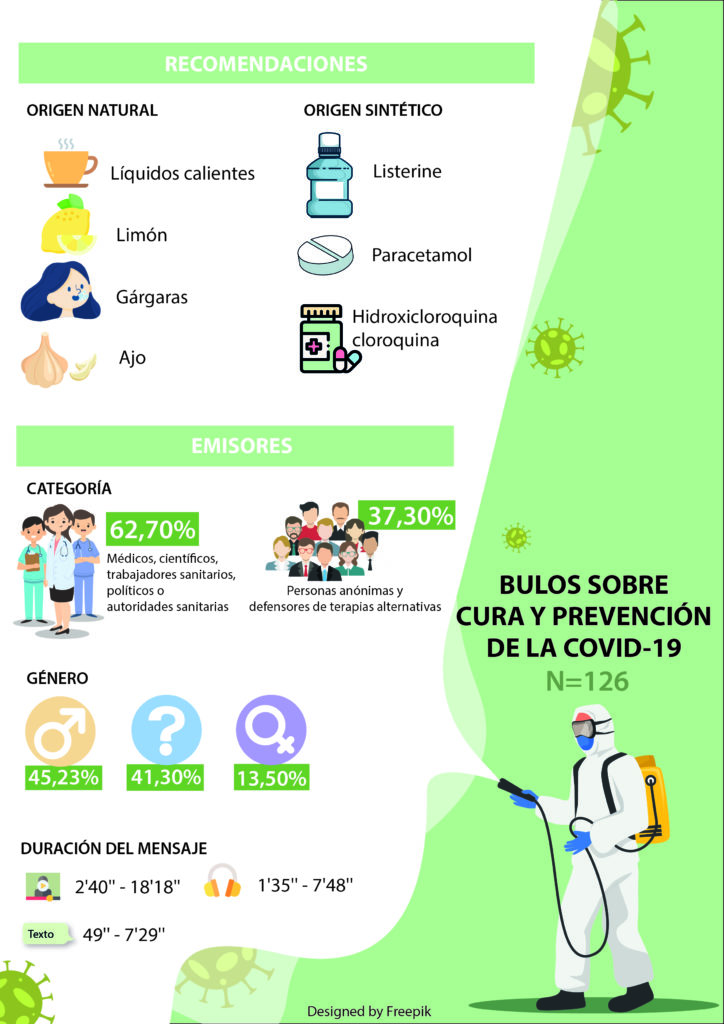
No doubt, the COVID-19 pandemic has triggered an unprecedented spread of disinformation. In fact, the main mobile phone operators in Spain warned during the first weeks of the State of Alarm that the data traffic in instant messaging multiplied by five.
In order to find out the characteristics of the hoaxes that were spread about COVID-19, the ScienceFlows research team set up a telephone number on March 18 for citizens to voluntarily send the hoaxes received.
Thus, the study has verified how the only topic of 50.8% of the hoaxes was the cure of the coronavirus. In addition, most of the hoaxes encouraged the consumption of some type of substance to prevent or cure COVID-19. Among these rumours, more than half (58.9%) proposed the consumption of substances of natural origin (water with lemon, ginger) and 32.1% promoted the consumption of substances of synthetic origin (such as drugs).
Regarding the natural remedies promoted through messaging, such as drinking hot beverages or lemon, they consider that, although they should not be dangerous per se, they can become so since they promote confidence in the therapeutic use of an infusion or of a maceration preparation for certain products while COVID-19 progresses, and that when a medical centre is visited, the situation could be particularly serious. Likewise, the four researchers claim that some of the disseminated hoaxes could cause the aggravation of the saturation of health systems due to the collateral effects derived from the use or implementation of some of their recommendations.
The majority of hoaxes encouraged the use of some kind of substance to prevent or cure COVID-19. Among these rumours, more than half (58.9%) suggested the consumption of substances of natural origin (lemon water, ginger) and 32.1% promoted the consumption of substances of synthetic origin (such as pharmaceuticals).
Methodology of the study
To carry out the study, a Spanish mobile phone number was set up so that people could participate in the research by voluntarily sending the hoaxes they were receiving on their devices. The telephone number was disseminated through an institutional press release from the Universitat de València. It was also disseminated through the website of the scientific news agency SINC, the Instituto Salud Sin Bulos and the ScienceFlows website. In total, from 18 March to 18 April 2020, 236 people voluntarily sent a total of 2353 messages (568 images, 678 text strings, 566 videos and 549 audios). Each message received was validated through the database of Maldita.es, a non-profit media organisation specialised in data verification.
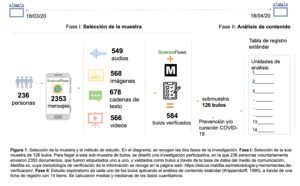
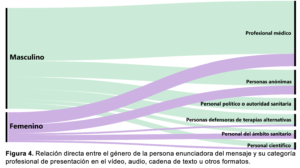
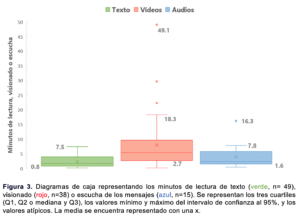
Media impact of the research
The article can be accessed here.

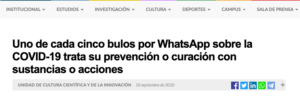
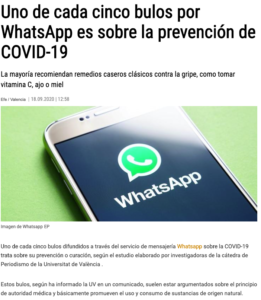
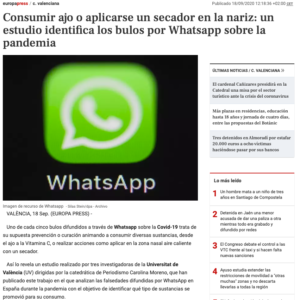
Agència SINC
Les faules de WhatsApp sobre la COVID-19 van promoure remeis casolans apel·lant a l'autoritat mèdica
Salamanca24horas
Un de cada cinc faules per WhatsApp sobre la COVID-19 tracta la seua prevenció o curació amb substàncies o accions
Diario de Sevilla
Un de cada cinc faules per WhatsApp és sobre la prevenció del COVID-19
Europa Press
Consumir all o aplicar-se un assecador en el nas: un estudi identifica les faules per WhatsApp sobre la pandèmia
Mediterráneo
Un de cada cinc faules tracta de curació del COVID-19
Levante-EMV
Un de cada cinc faules per WhatsApp és sobre la prevenció de COVID-19
El Independiente
Un de cada cinc faules per WhatsApp és sobre la prevenció de COVID-19
La Razón
Les faules més ridícules sobre el coronavirus
Las Provincias
Un de cada cinc faules per Whatsapp sobre la COVID-19 insta a consumir substàncies i remeis casolans
Redacción Médica
Un de cada cinc faules per WhatsApp sobre la COVID-19 tracta la seua prevenció o curació amb substàncies o accions
Onda Cero Comunitat Valenciana
Carolina Moreno: “Estem treballant amb un projecte europeu per a dissenyar una app per a majors que els diga si es tracta o no d'una faula”
















